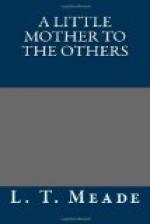“I don’t know what you call her, but I is named after her, and I mean to be like her. My beautiful mother said I was to be like her, and I’m going to twy. See, now, here is the bow”—she held up the crooked bow as she spoke—“and I only want the arrow. Will you help me to make the arrow? I thought—oh, I did think—that if you hated Aunt Jane you would help me to make the arrow. Here’s the stick, and if you have a knife in your pocket you can just sharpen it, and it will make the most perfect arrow in all the world. I’ll love you then. I’ll help you always. I’ll do my lessons if you ask me, and I’ll twy to be good to you; ’cos you and me we’ll both have our enemies, and p’w’aps, if I’m not stwong enough to use the bow, p’w’aps you could use it, and we might go about together and sting our enemies, and be weal fwiends. Will you twy? Will you make me the little arrow, p’ease, p’ease?”
“And what are you going to do with the arrow when it is made?” asked Miss Ramsay. “I happen,” she continued, without waiting for Diana’s reply, “to have a knife in my pocket, and I don’t mind sharpening that piece of wood for you. But bows and arrows are dangerous weapons for little girls like you.”
“Course they is dangerous,” said Diana. “What would be the use of ’em, if they wasn’t? They is to pwick our enemies and p’w’aps kill ’em.”
“But look here, Diana, what do you want this special bow and arrow for?”
“I want to have Aunt Jane Dolman and Simpson shotted. I’ll tell you why I want ’em both to be shotted—’cos Simpson killed my spiders and beetles, and Aunt Jane Dolman is a poky old thing and she shut me up in a punishment woom. Now wouldn’t you like to help me—and then we’ll both have deaded our enemies, and we’ll be as happy as the day is long.”
Miss Ramsay was so astounded at Diana’s remarks that she slowly rose from her seat and stared for nearly half a minute at the little girl.
“Well,” she said at last, “I have seen in my lifetime all sorts of children. I have taught little girls and boys since I was eighteen years of age. I have seen good children and naughty children, and clever children, and stupid children, but I have never met anyone like you, little Diana Delaney. Do you really know what you are saying? Do you know that you are a very, very wicked little girl?”
“Are I?” said Diana. “Well, then, I like being a wicked little girl. I thought p’w’aps you would help me; but it don’t matter, not one bit.”
Before Miss Ramsay could say another word Diana had turned abruptly and flown, as if on the wings of the wind, right down through the wood.
The governess watched the little figure disappearing between the oaks and elms until at last it quite vanished from view. She felt a momentary inclination to go after the child, but her book was interesting, and her seat under the overhanging elm extremely comfortable. And this was a holiday, and she worked hard enough, poor thing, on working days. And, after all, Diana was nothing but a silly little child, and didn’t mean half she said.




